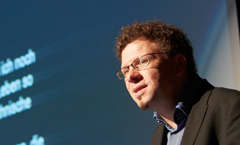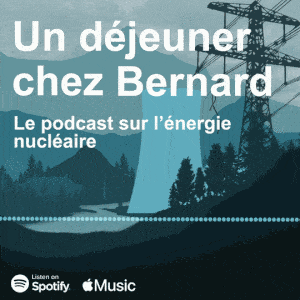Published online 15 august 2015
On this page :
• Executive Summary [fulltext] of the report « The French nuclear industry in deadlock »
• About the main author : Yves Marignac (2012 Nuclear-Free Future Award Laureate)
• PDF Downloads (Executive Summary / French version of the report)
• Also on Global-Chance.org (related contents & sections)
THE FRENCH NUCLEAR INDUSTRY IN DEADLOCK
the burden of france’s nuclear gamble in the era of the energy transition
Yves Marignac & Manon Besnard, WISE-Paris, 23 June 2015
(Report commissioned by Greenpeace France)
EXECUTIVE SUMMARY
The deep crisis which the French nuclear industry is experiencing is no real novelty, despite the fact that its suddenness and extent may surprise even the most critical observers. It actually represents the outcome of a strategy launched at the end of the 1990s, of which the fundamental principles have long been considered flawed. The project involved an aggressive export development policy to make up for the foreseeable difficulties on a national level. The errors of judgment with regard to the international dynamics of nuclear power, its advantages for the country and the technical solutions put forward by French industry have turned projected growth into massive losses. Facing declining markets and increasing expenditure on a domestic level, EDF and Areva cannot keep up for long. The French State, which is liable for this strategic failure, must now step up and play its full role. The industrial restructuring that it has just undertaken is necessary, but alone will not save the industry. The deep roots of the crisis mean that tomorrow the same priorities cannot be profitable, and only genuine reorientation can prevent further disaster for the French economy.
The French nuclear industry is indisputably undergoing a major crisis in 2015, marked by the Areva’s announcement of catastrophic results. This champion of the integrated model (reactors, services, fuel, etc.) founded fifteen years ago was supposed to have succeeded on a global scale. With four years of losses, including a record figure of €4.8 billion in 2014 and debts of €5.8 billion against a turnover of €8.3 billion, the group is facing bankruptcy and cannot sidestep a far-reaching redistribution of its business operations.
Despite less worrying results, the EDF group, whose fifty-eight nuclear reactors operated in France provide more than 75% of the country’s electricity, is also experiencing a difficult situation. Boosted by its turnover of €72.9 billion, the electricity company recorded net profits of €3.7 billion in 2014.
Yet its debt situation is increasingly a matter of concern, reaching €34.2 billion and its cash flow has been massively negative for several years, resulting in a recurrent inability to cover its increasing investment needs.
A far cry from being a symbol of French industrial success, the future of the national nuclear industry is called into question. In the era of the energy transition, in which France has set itself the objective of lowering the share of nuclear power in its electricity generation to 50% by 2025, this future will be unable to reproduce the past. Against this backdrop, it is all the more necessary to get to the deeprooted causes of the industry’s current difficulties in order to analyse its actual prospects more clearly.
In fact, the crisis is not only due to a problem of industrial organisation or of a cyclical decline following the Fukushima-Daiichi disaster. More structural explanations must be found in the basic principles of the strategy implemented for more than a decade. The solutions rolled out require an analysis of these principles.
The illusion of a nuclear “renaissance”
Above all, this strategy is based on the idea that French nuclear power could access a dynamic and buoyant market in Europe and worldwide. The export dimension has long been a significant argument to justify a project traditionally associated with France’s recovery of its international magnitude.
Since the end of the 1990s, the French nuclear industry has maintained the idea that nuclear power is the only source likely to meet the strong growth in global energy demand by producing massive amounts of non-carbon energy. It theorized the turnaround in reactor orders at the turn of the century as a magnificent nuclear “renaissance”, while claiming its leading position.
Buoyed by the massive, and therefore more visible, nature of nuclear projects in relation to the much more scattered development of renewable energy sources, it reinforced the idea that renewable energy could only take a subsidiary role. This vision is increasingly far from reality.
After peaking at 17.6% of global electricity generation in the mid-1990s, the share of nuclear power dropped to 10.8% in 2014. Between 2000 and 2014, in-service capacity of nuclear power only increased by 7.5%, i.e. almost seven times slower than the total global electricity generation capacity (if the sustained stoppage of forty-eight reactors in Japan is deducted, nuclear capacity has even declined by 6% over this period).
This decline in nuclear power is set to gain pace as the new constructions of reactors, between sixtyfive and seventy depending on the source, are currently insufficient to offset the closures of an ageing global fleet (439 units operated for more than twenty-nine years on average). Since 2010, investments in nuclear generation have only represented an average of less than $10 billion per year worldwide.
By means of comparison, renewable energy sources are enjoying strong growth. Over the same period (2000-2014), they represent investments of more than $150 billion on average, and their share in global electricity generation, constantly rising, reached 22.8% in 2014.
The uniqueness of French nuclear power
Up to now, France has maintained the uniqueness of its electricity mix despite these developments. Out of the thirty-one countries operating nuclear power plants, it is the only one in which this energy source significantly exceeds 50% of its electricity generation. In 2014, renewable energy sources only contributed to 17.7% of electricity consumption, and France is lagging behind with regard to its European commitment to reach 27% by 2020.
While France undertook the construction of a new nuclear reactor, the Flamanville-3 EPR, in 2005, the pace at which it has launched new renewable capacities seems very slow in view of the country’s potential. With 8 GW of wind power and 5 GW of solar power installed between 2000 and 2013, France has developed these energy sources 2.5 times slower than the European average, and respectively 3.3 and 7 times slower than Germany, which has less potential in terms of these two energy sources.
In terms of investments, France is currently making roughly the same effort for nuclear power as for renewable energy. While this may seem a major adjustment on the domestic front, it is, however, very far from the high priority given to renewable energy over nuclear power in European and global investments : energy policy hesitates between loyalty to its traditional model and a shift to future growth sectors.
The French nuclear industry’s failure on an international level
The underlying idea behind these decisions is still that France gives priority to its nuclear industry in terms of energy to support its export capacity, and that these exports are significantly advantageous for the French economy. France’s performance in this field, however, has not been a success.
The positions occupied by France in the sector of mining, enrichment and conversion are ultimately relatively comparable to the approximate 20% stake occupied by French nuclear power plants in the global fleet. The same goes for the sectors of maintenance and reactor services, and for decommissioning and waste management activities. Out of these different business sectors, the market shares held by the various players change relatively little.
Two sectors stand out. The first and most important is the new reactor construction sector. French industry has clearly stated its great ambitions in this field, offering both turnkey reactor construction by Areva and the export of the constructor-operator model proposed by EDF. However, only three units of the EPR reactor proposed by France are under construction worldwide, in Finland and in China. No other order has been taken in eight years. In total, counting the eleven reactors previously exported, France has only provided 2% of reactors completed or under construction outside of the country.
The second sector is that of the reprocessing of spent fuel and the reuse of the resulting plutonium as MOX (mixed oxides) fuel. France, which has made this option own management solution, offers this service to foreign electricity companies. Yet out of the thirty-one countries operating nuclear power plants, twenty-five have never used or have ceased to use reprocessing. The La Hague plant has lost practically all of its foreign clients over the last decade, with the exception of the Dutch operator, which has only one reactor : it therefore only uses provides reprocessing service to 0.2% of installed nuclear capacity abroad. Areva holds almost around 90% of this global market, but currently the market consists almost solely of EDF.
A questionable outcome for French industry
It is difficult to conduct a full comparative analysis of the advantages and disadvantages related to the industrial priority France has given to nuclear power. One can, nevertheless, question the real benefits provided by this choice for the country by highlighting a few key aspects.
The first point is that, as France is providing political support to domestic and exported nuclear power, it is also neglecting its renewable energy industry. As a result, it is lagging far behind in international competition in this field, particularly in the two sectors currently experiencing massive growth, namely wind and solar power.
France has thereby neglected an important potential. By means of example, the German renewable energy industry recorded more than €13 billion per year in export turnover in these two sectors in 2012-2013. In comparison, French industry recorded an export turnover of €5.8 billion in nuclear goods and services, to which can be added approximately €2 billion per year from EDF’s net electricity exports from France to its European neighbours.
It is, however, important to consider that most of the approximate €1.5 billion in added value created by French nuclear business abroad is based on plants and services located in the countries in question, where it therefore remains. These activities also often record significant liabilities : the acquisitions of Constellation Energy in the USA by EDF and of Uramin by Areva cost them losses of at least €2.7 billion and €1.5 billion respectively, while the additional costs and delays of the Finnish EPR account for at least €3 billion more in Areva’s losses. Alone, these three items represent more than €0.5 billion in losses per year averaged out over the last ten years.
Conversely, the operation of French nuclear power gives rise to imports, ranging from uranium, which represents a cost of approximately €0.5 billion per year, to more than 20% of the facilities and services required for the construction of the Flamanville-3 EPR. Lastly, the analysis must also include the fact that the development of renewable energy sources in France now mainly relies on imports, due to the lack of a French industrial champion.
EDF’s bleak future
Failing the ability to provide the expected benefits to the domestic economy, the French nuclear industry’s international strategy should at least serve the companies that support it. Faced with the prospect of a saturated market and increasing costs in France, they used their French base to roll out their international business so that it could in return finance the continuation of their domestic project.
This strategy did not work for EDF. Besides its participation in the two EPR under construction in China, affected by delays and additional costs, its export strategy as an operator-constructor of many EPRs failed in the USA, Italy and South Africa, and remains hindered by many obstacles in the United Kingdom, where the Hinkley Point project has so far cost the group around €1.5 billion.
Burdened by losses, EDF’s foreign activities are currently unable to finance its increasing requirements in France, where the production costs of nuclear plants are rising by around 5% each year and investment needs are also increasing. The extension of operations at the nuclear plants, which exceed an average of thirty years, beyond forty years would cost at least €110 billion, or even more if the safety requirements come closer to the target level for the EPRs. Most of the reinforcement project must be completed over ten years. EDF does not seem to have the financial and industrial capacity today to successfully conduct such a project.
In addition to the crossover between historically low financing capacities and historically high investment requirements, EDF faces another scissor effect, as market prices seem to be on a longlasting downward trend and are already lower than the nuclear plants’ production costs (between €38 and €40/MWh as against €42/MWh), which are conversely on the rise. In view of the opening of an increasing proportion of the French market and the evolution of regulated tariffs, EDF is set to witness the erosion of its sales, and the growing risk of not being able to make the investments concerning the extension of its fleet profitable through sales.
The renewal of the fleet of power plants seems even more out of reach. The cost of the Flamanville-3 EPR project, launched in 2005 to anticipate this possible requirement, has been multiplied by 2.8 and its timeframe by 2.4, even before the announcement in April 2015 of a major manufacturing defect in the vessel that could compromise the entire project. With a production cost now expected to reach around €90/MWh, the EPR is no longer able to compete with the most attractive renewable energy sources.
The Areva disaster
Areva, which has less solid foundations than EDF, pays a heavier and more immediate price for the failure of its international development. Areva’s gamble, which granted a set price to win the first third-generation reactor order with Olkiluoto-3 to act as its international showcase, has backfired. The fiasco of this project, at a cost currently estimated at €8.5 billion as against the €3.3 billion initially projected and which records total delays of more than nine years, significantly reduces prospects for new exports. Today, Areva has no other potential direct orders than the two EPRs that have been the subject of talks with India for almost five years. The reactor constructor has no other real alternative either : the design of the ATMEA reactor remains at this stage much too preliminary for a genuine sales proposal to be launched.
The situation is not much better for the group’s second traditional business area : the plutonium industry. Areva suffered another great failure with the construction of a MOX plant at Savannah River in the USA, which has more than fifteen years of delays and soaring costs, to the extent that the project is all but shelved today. Above all, the continuation of its reprocessing business at La Hague is subject to the same increasing costs and investment requirements as for reactors, while EDF takes advantage of its position as sole client to cut prices, thereby endangering the plant’s profitability.
Technically bankrupt, Areva cannot avoid drastic restructuring in the short term, including a total or partial take-over of its businesses and recapitalisation. Yet there is no sign that such actions will revive prospects in these two key sectors in which Areva’s business seems to be in deadlock.
The imperative return of the State as a strategist
EDF was a long-standing state-run company, and the French State still has an 84.5% share in the group. The State also chaired the creation of Areva of which it also has a current share, mostly directly or via the French Atomic Energy Commission (CEA) of 86.5%. It therefore has a large share of responsibility in the strategic directions taken by the French nuclear industry for many years, and in the deadlock they have led it to.
However, the State has acted in recent years as though no crisis was on the cards. The contradictory targets it imposes on EDF – to invest more while cutting costs and creating dividends, without any considerable increases to French regulated tariffs – seem to be guided by the increasingly unrealistic idea that the current nuclear plant fleet represents an income. At the same time, the State has never really reacted, prior to the situation it finds itself in today, to Areva’s increasing difficulties.
The government must now resum its role as a strategic driver to accept its liability in the failure and to redefine realistic prospects for the French nuclear industry, in line with the nuclear reduction policy that it is defining as part of the energy transition. Clearly, it will not be sufficient to reorganize the industry by calling on EDF to absorb Areva’s reactor business or any other of its activities, to inject more capital and cover losses. As regards reprocessing, the interests of EDF, for which it represents additional costs, and of Areva diverge, particularly as the continuation of this activity will give rise to significant reinvestment. For the new reactors, it is in EDF’s interest to preserve the maintenance capacity, but the continuation of a reactor export capacity, with only lessening potential, does not make sense.
The situation calls for not simply restructuring but a totally new direction. If the fundamental principles that have precipitated the French nuclear industry into its current crisis are not acknowledged, much effort and public money will be invested in an approach which is doomed to fail. The international trend is not for a nuclear renaissance but for a boom in renewable energy, and France will not be able to export significantly more reactors, or to develop new reprocessing contracts abroad under profitable conditions. The future of the French nuclear industry must urgently shift its focus to the maintenance of current reactors and decommissioning and nuclear waste management services.
ABOUT THE MAIN AUTHOR : YVES MARIGNAC
« the leading independent energy consultant in france »
Yves Marignac received the 2012 Nuclear-Free Future Award « for applying his rigorous expertise to plot a sustainable energy plan so that France can stand out as a beacon to a world longing to become nuclear-free » :

(Source : Nuclear-Free Future, 2012)
Yves Marignac is widely acknowledged as the leading independent energy consultant in France. With his expertise he leads the non-profit organization WISE-Paris (World Information Service on Energy). He is co-author of the manifesto NégaWatt, a work that outlines the steps needed to turn France into a nuclear-free nation.
Independent nuclear and energy policy experts in France, a country crucially dependent on nuclear power, are few indeed. Yves Marignac is a respected member of this select corps. Marignac’s consultant work covers a wide range of nuclear issues for various institutional bodies and NGOs at the national and international level, from the European Parliament and the Centre National de la Recherche Scientifique (CNRS), Europe’s largest fundamental science agency, to the Paris environmental ministry, as well as the World Wide Fund for Nature (WWF). Marignac is the author or co-author of a number of books and other publications, including Nuclear Power, the Great Illusion - Promises, Setbacks and Threats (October 2008), and Spent Nuclear Fuel Reprocessing in France (April 2008).
Marignac’s glowing reputation was underscored this past year, when, together with Arjun Mahhijani, he published a 178-page report commissioned by Greenpeace France : a detailed alternative analysis of the post-Fukushima nuclear reactor stress tests carried out across La Grande Nation. Marignac and Mahhijan uncovered concrete constructional flaws in the safety assessments which gravely undermined test results. Immediately following the publication of the report, L’Autorité de sûreté nucléaire (ASN), together with the Institut de Radioprotection et de Sûreté Nucléaire (IRSN), invited the study’s two authors to participate in an internal conference debate - a premiere move by the government agencies. The ASN website leaks this much : « Participants were pleased with the quality of the discussion. »
In 1997 Marignac joined World Information Service on Energy (WISE), an NGO dedicated to « promoting independent information and well-informed decision-making regarding the use of nuclear energy for power generation. » In 2009, as WISE-Paris executive director, Yves traveled to the United States to make policy makers in Washington aware that the “French nuclear model”, touted by nuclear power lobbyists as clean energy par excellence, is actually a dangerous mirage. Marignac said : « I am at a loss to understand how the United States could be so far off the mark in its understanding of the French experience with nuclear power. The so-called “success story” of the French nuclear program, which is being promoted so assiduously by the U.S. Nuclear industry, is a complete disconnect with the stark reality of the 50-year history of rising costs, steadily worsening delays, technological dead-ends, failed industrial challenges and planning mistakes. The United States could make few worse mistakes than embracing France’s sorry nuclear legacy. If American policymakers are going to weigh the example of France, they need to get the facts instead of settling for the fantasy being sold to them by the U.S. nuclear industry. »
Over the past fifteen years of painstaking work, Marignac’s ambition has been to undo the French “toutnucléaire”, and help usher the world to a clean energy future. The 43-year-old father of three considers his Nuclear-Free Future Award as a sort of segment win along the way ; he realizes that a long, formidable stretch yet lies before us.
(Source : Nuclear-Free Future, 2012)
PDF DOWNLOADS
Executive Summary
The French nuclear industry in deadlock - Executive Summary [pdf file, 225 Ko]
Yves Marignac & Manon Besnard, WISE-Paris, 23 June 2015, 5 pages
Also available in French : Nucléaire français : l’impasse industrielle - Synthèse [pdf file, 320 Ko]
French version of the report
Nucléaire français : l’impasse industrielle [pdf file, 2.2 Mo]
Le poids du pari industriel nucléaire de la France à l’heure de la transition énergétique
Yves Marignac & Manon Besnard, WISE-Paris, Rapport commandé par Greenpeace France, mardi 23 juin 2015, 72 pages
ALSO ON GLOBAL-CHANCE.ORG
Yves Marignac’s publications (selection)Global Chance’s recent publications (on nuclear and energy transition)Les Dossiers de Global-Chance.org (thematic sections)
Yves Marignac’s publications (selection)
Le nucléaire français confronté à ses erreurs de stratégie
Yves Marignac (entretien), Journal de l’énergie, jeudi 25 juin 2015
Fabrication Flaws in the Pressure Vessel of the EPR Flamanville-3
Yves Marignac, WISE-Paris Briefing, 12 april 2015
Audition de Yves Marignac par la commission d’enquête de l’Assemblée nationale sur les coûts de la filière nucléaire
Yves Marignac, mercredi 26 mars 2014 / Document support : Diaporama « L’échéance des 40 ans pour le parc nucléaire français », 16 pages
L’échéance des 40 ans pour le parc nucléaire français
Processus de décision, options de renforcement et coûts associés à une éventuelle prolongation d’exploitation au delà de 40 ans des réacteurs d’EDF
Yves Marignac, Wise Paris, samedi 22 février 2014, 171 pages
Discours d’acceptation du « Nuclear-Free Future Award 2012 »
Yves Marignac, Heiden (Suisse), samedi 29 septembre 2012
Sortir enfin du délire énergétique
Thierry Salomon et Yves Marignac (interview), Charlie Hebdo, n°1028, mercredi 29 février 2012, propos recueillis par Fabrice Nicolino
Sûreté nucléaire en France post-Fukushima. Analyse critique des évaluations complémentaires de sûreté (ECS) menées sur les installations nucléaires françaises après Fukushima
Arjun Makhijani et Yves Marignac, Rapport d’expertise IEER / WISE-Paris, 176 pages, lundi 20 février 2012
Manifeste négaWatt : réussir la transition énergétique
Thierry Salomon, Marc Jedliczka et Yves Marignac, Association négaWatt / Éditions Actes Sud, janvier 2012, 376 pages
Sellafield radioactive discharges : Breach of international convention in normal operation
Yves Marignac, International Panel on Fissile Materials Blog, February 25, 2011
(Back to... Top / Also on Global-Chance.org)
Global Chance’s recent publications
Imaginer l’inimaginable ou cultiver son jardin ?
Les Cahiers de Global Chance, n°37, juin 2015, 100 pages
Autour de la transition énergétique : questions et débats d’actualité (suite)
Les Cahiers de Global Chance, n°36, novembre 2014, 68 pages
Autour de la transition énergétique : questions et débats d’actualité
Les Cahiers de Global Chance, n°35, juin 2014, 84 pages
Le casse-tête des matières et déchets nucléaires
Les Cahiers de Global Chance, n°34, novembre 2013, 76 pages
Des questions qui fâchent : contribution au débat national sur la transition énergétique
Les Cahiers de Global Chance, n°33, mars 2013, 116 pages
L’efficacité énergétique à travers le monde : sur le chemin de la transition
Les Cahiers de Global Chance, n°32, octobre 2012, 180 pages
L’énergie et les présidentielles : décrypter rapports et scénarios
Les Cahiers de Global Chance, n°31, mars 2012, 100 pages
...
Nuclear power, the great illusion. Promises, setbacks and threats
Les Cahiers de Global Chance, n°25 bis, october 2008, final version
(Back to... Top / Also on Global-Chance.org)
Les Dossiers de Global-Chance.org
Climat : n’oublions pas le méthane !
Rapports, analyses, tribunes, interviews, etc. :
Les travaux de Global Chance et de ses membres sur le mésusage du concept de « PRG »
Fukushima : réactions en chaîne
Tribunes, analyses, interviews, etc. :
Les réactions des membres de Global Chance face à la catastrophe nucléaire de Fukushima
Nucléaire : par ici la sortie !
Rapports, analyses, tribunes, interviews, etc. :
Les propositions de Global Chance et de ses membres pour, enfin, sortir du nucléaire
Dossier clos le 31 décembre 2012
Accidents nucléaires : de l’improbable à l’imprévisible
Rapports, analyses, tribunes, interviews, etc. :
Les contributions de Global Chance et de ses membres au débat sur la sûreté nucléaire
Déchets nucléaires : qu’en faire ?
Rapports, analyses, tribunes, interviews, etc. :
Les analyses de Global Chance et de ses membres sur la question des déchets nucléaires
Gaz de schiste : miracle ou mirage ?
Rapports, analyses, tribunes, interviews, etc. :
Les contributions de Global Chance et de ses membres au débat sur les gaz de schiste
Nucléaire : une indépendance énergétique en trompe-l’œil
Rapports, analyses, tribunes, interviews, etc. :
Global Chance et ses membres dénoncent le mythe d’une « énergie 100% nationale »
Nucléaire : quand la facture explose...
Rapports, analyses, tribunes, interviews, etc :
Le débat sur les coûts réels du nucléaire vu par Global Chance et ses membres
Bure : ceci n’est pas un débat public
Contributions, analyses, vidéos....
Global Chance et ses membres dans le « débat public » sur le projet Cigéo
(Back to... Top / Also on Global-Chance.org)
 Global Chance
Une expertise indépendante sur la transition énergétique depuis 1992
Global Chance
Une expertise indépendante sur la transition énergétique depuis 1992
 The burden of France’s nuclear gamble in the era of the energy transition
The burden of France’s nuclear gamble in the era of the energy transition




